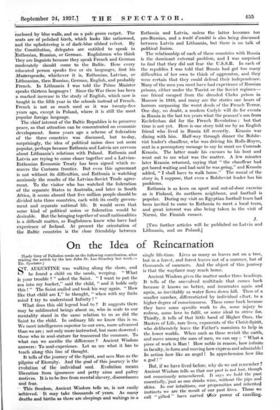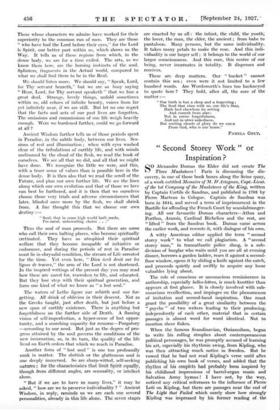On the Idea of Reincarnation
- tLady Grey of Fallodon sends us the following contribution, after reading the article by the late John St. Loe Strachey last week.— En. Spectator.]
ST. AUGUSTINE was walking along the shore, and he found a child on the sands, weeping. " What is your trouble ? " asked the Saint. " I want to put the sea into my bucket," said the child, " and it holds only this ! " The Saint smiled and took his way again. " How like that child am I," he thought, " when with my finite mind I try to understand Infinity ! "
What does this old legend lead to ? It suggests there may be sublimated beings about us, who in scale to our mentality stand in the same relation to us as did the Saint to the child. In ordinary life we know this is so. We meet intelligences superior to our own, more advanced than we are ; not only more instructed, but more dowered : those who in soul-stature far transcend the common. To what can we ascribe the difference ? Ancient Wisdom answers : To soul-experience. Let us see what it has to teach along this line of thought.
It tells of the journey of the Spirit, and sees Man as the pilgrim of Eternity. And the goal of this journey is the evolution of the individual soul. Evolution means liberation from ignorance and petty aims and paltry motives. It is to be free from mental slavery, discordances and fear.
This freedom, Ancient Wisdom tells us, is not easily achieved. It may take thousands of years. As many deaths and births as there are sleepings and wakings in-a single life-time. Lives as many as leaves not on a tree, but in a forest, and forest leaves not of a summer, but of thousands of summers. And the object of this journey is that the wayfarer may reach home.
Ancient Wisdom gives the matter under three headings. It tells of the unevolved multitude that comes back because it knows no better, and incarnates again and again, as inevitably as water flows down hill. Then of a smaller number, differentiated by individual effort, to a higher degree of consciousness. These come back because they have some specific work to do, some injury to redress, some love to fulfil, or some ideal to strive for. Thirdly, it tells of that little band of Higher Ones, the Masters of Life, rare lives, exponents of the Christ-Spirit, who deliberately leave the Father's mansions to help in the lower worlds. When such as these revisit the earth, and move among the sons of men, we can say : " What a piece of work is Man ! How noble in reason, how infinite in faculty, in form and moving how express and admirable In action how like an angel ! In apprehension how like a god ! "
But, if we have lived before, why do we not remember ? Ancient Wisdom tells us that our past is not lost, though not consciously remembered. It says we hold the past essentially:just as one drinks wine, without the pips and skins. In our intuitions, our propensities and inherited instincts we are the result of our past lives. Those we call " gifted " have carted Ofeir power of excelling. ThoSe whose characters we admire have worked for their superiority to the common" run of men. They are those " who have had the Lord before their eyes," for the Lord is Spirit, our better part within us, which shows us the Way. It tells us of those regiOns from which, in the dense body, we are for a time exiled. The arts, as we know them here, are the homing instincts of the soul. Splinters, fragments in the Actual world, compared to what we shall find them to be in the Real.
We should listen more. We should say, " Speak, Lord, for Thy servant heareth," but we are so busy saying " Hear, Lord, for Thy servant speaketh " that we lose a great deal. Strange, lovely things, unfold sometimes within us, old echoes of infinite beauty, voices from far yet infinitely near, if we are still. But let no one regret that the facts and acts of our past lives are forgotten. The omissions and commissions of one life weigh heavily enough. Were we burdened further, could we go forward at all ?
Ancient Wisdom further tells us of those periods spent in Paradise, in the subtle body, between our lives. Ses- sions of rest and illumination ; when with eyes washed clear of the tribulations of earthly life, and with minds undimmed by the cloud of the flesh, we read the book of ourselves. We see all that we did, and all that we might have done. We recognize the little we were, and this, with a truer sense of values than is possible here in the dense body. It is then also that we read the scroll of the Future, and plan our own further life. We see the lines along which our own evolution and that of those we love can best be furthered, and it is then that we ourselves choose those very trials and adverse circumstances that later, blinded once more by the flesh, we shall shrink from. A fine thought this that we choose our own destiny :— " Soul, that in some high world lath made,
• Pre-natal, unbewailing choice . . ."
Thus the soul of man proceeds. But there are some who call their own halting places, who become spiritually cretinated. They have so atrophied their spiritual welfare that they become incapable of initiative or endurance, and during the periods of rest in Paradise must lie in chrysalid condition, the stream of Life arrested for the time. Yet even here, " Dieu ecrit droit sur lee dignes de iravers," the arm of the Lord is not shortened. In the inspired writings of the present day you may read how these are cared for, reawoken to life, and educated. But they lose step with their spiritual generation, and form one kind of what we know as " a lost soul."
The waters of Lethe figure our rebirth and our for- getting. All drink of oblivion in their descent. Not as the Greeks taught, just after death, but just before a new span of earthly existence. There is anything but forgetfulness on the further side of Death. A flaming vision of self-imperfection, a hyper-sense of lost oppor- tunity, and a scorching capacity for remorse—Purgatory —according to our need. But just as the degree of pro- gress attained by the soul governs the conditions of the new incarnation, so, in its turn, the quality of the life lived on Earth orders that which we reach in Paradise.
Another form of " lost soul " is one too profoundly sunk in matter. The sluttish or the gluttonous soul is one deeply immersed. So are sharp-witted, self-seeking natures ; for the characteristics that limit Spirit equally, though from different angles, are sensuality, or intellect alone.
" But if we are to have so many lives," it may be asked, " how are we to preserve individuality ? " Ancient Wisdom, in reply, reminds us we are each one several personalities, already in this life alone. The seven stages are enacted by us all :" the infant, the child,- the youth; the lover, the man, the elder, the- ancient ; from babe to pantaloon. Many persons, but the same individuality. It takes many petals to make the rose. And this indi- viduality is our larger self ; • it belongs to the world of our larger consciousness. And this core, this centre of our being, never incarnates in totality. It dispenses and receives.
These are deep matters. Our " bucket " cannot contain this sea ; even were it not limited to a few hundred words. Are Wordsworth's lines too hackneyed to quote here ? They hold, after all, the core of the matter :— " Our birth is but a sleep and a forgetting ; The Soul that rises with us, our life's Star, Rath had elsewhere its setting
And cometh from afar ; Not in entire forgetfulness, And-not in utter nakedness, But trailing clouds of glory do we coma From God, who is our home."
PAMELA GREY.











































 Previous page
Previous page